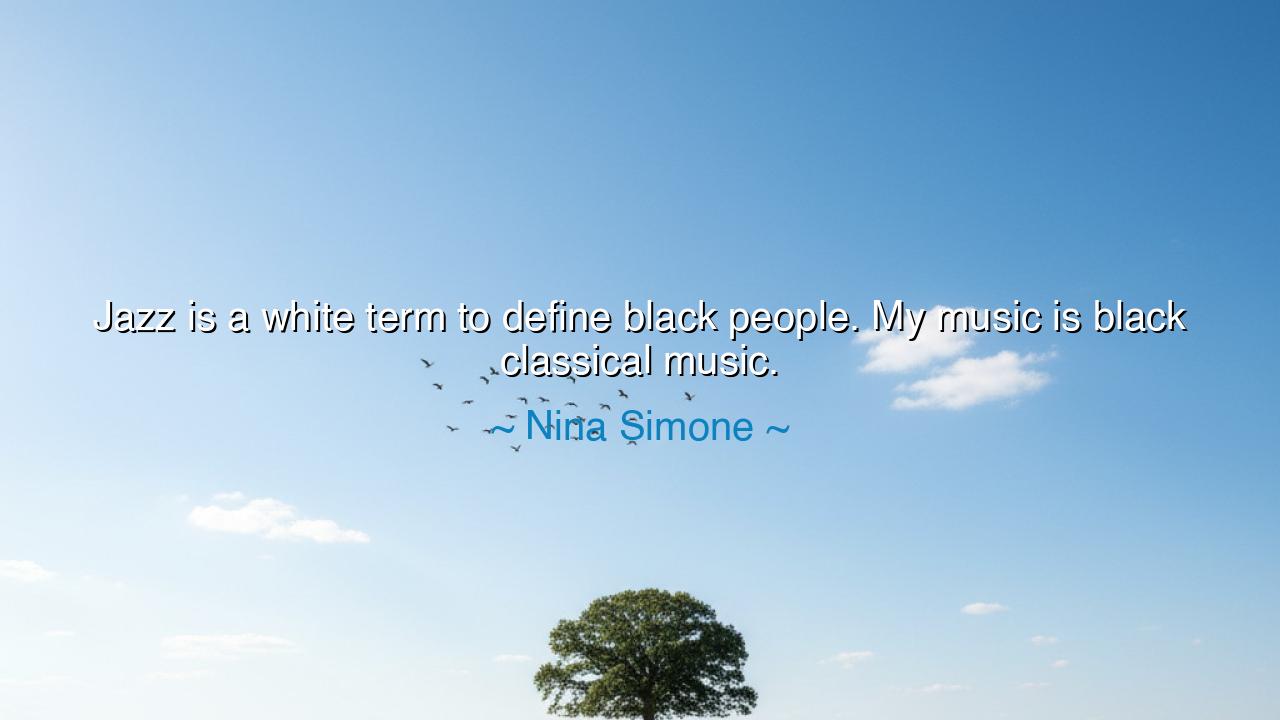
Jazz is a white term to define black people. My music is black






"Jazz is a white term to define black people. My music is black classical music." Thus spoke Nina Simone, priestess of song and prophetess of truth, whose voice carried both the beauty and the fury of her age. In these words, she unveils a great reality: that names are never neutral, and that language can bind as well as liberate. To call her art jazz was, in her eyes, to diminish it, to confine it within a box built not by her people, but by those who sought to tame and categorize what they could not fully understand. Her cry was not merely about music, but about history, identity, and power.
The origin of this truth lies in the soil of America, watered with the blood and tears of the enslaved. From the fields rose spirituals, from the sorrow rose the blues, and from the fire of survival rose a sound unlike any the world had heard. This was not entertainment—it was testimony. Yet when this sound began to spread, it was branded with names that often stripped it of dignity, placing it in the margins of “popular” or “other,” while European traditions alone were called classical. Nina Simone shattered this false hierarchy, proclaiming that her music—born of struggle, resilience, and brilliance—was as profound and eternal as Beethoven, as structured and majestic as Bach.
Consider Simone’s own life: a child prodigy, she trained at the piano with the dream of becoming a concert pianist, steeped in the European canon. Yet when the gatekeepers of conservatories shut their doors, when racism denied her the stage of so-called classical halls, she turned her genius toward song. But she never abandoned the discipline of her training. Every chord she struck, every note she sang, carried the weight of both tradition and rebellion. To call it mere jazz was to miss the truth—it was, in her words, black classical music, the voice of a people carved into eternal form.
History echoes her claim. When the blues arose, many dismissed it as crude. When gospel soared, it was mocked as primitive. When Louis Armstrong lifted his trumpet, or when Duke Ellington built his orchestras, they were celebrated yet never granted the title of “classical.” And yet, what is classical but that which endures, that which shapes the soul of civilization? By this measure, the music of black America is indeed classical, for it has shaped the very heart of the modern world.
The meaning, then, is both fierce and liberating. Simone teaches us that labels can be cages, and that true art must break them. To call her work black classical music was to demand respect for its depth, its artistry, its eternal power. It was to declare that the creations of her people were not lesser, not “other,” but central, foundational, immortal. She reclaimed dignity with her words, and with them gave her people back the honor denied them by a world quick to exploit their gifts but slow to name their greatness.
The lesson for us is clear: we must be vigilant about the names we use, and the ways they shape perception. Do not accept without question the categories handed down by power, for they often serve to diminish. Seek instead to name things as they truly are, to give honor where honor is due. And when others seek to confine you with their definitions, remember Simone’s defiance—claim your own voice, your own truth, your own name.
Practical wisdom calls us to action: listen to the music of the oppressed not as novelty, but as scripture. Study the roots, honor the pain, and recognize the artistry. And in your own life, whether in art, work, or daily struggle, refuse to be a prisoner of labels that do not honor your truth. Create boldly, live truthfully, and, like Simone, declare what your work truly is, even if the world does not yet understand.
Therefore, children of tomorrow, remember Nina Simone’s teaching: jazz is too small a word, too shallow a vessel, for the ocean of truth her people created. It is not a footnote to Western art, but a new classical voice, born of chains but stronger than steel. Call it by its rightful name: black classical music. And let this remind you always to honor the creators who came before you, and to fight for the dignity of your own voice.






AAdministratorAdministrator
Welcome, honored guests. Please leave a comment, we will respond soon